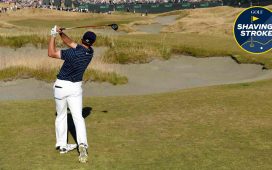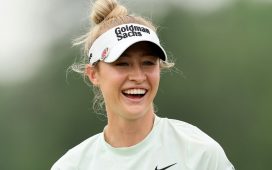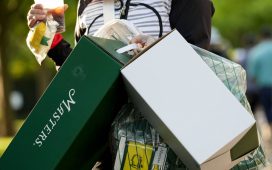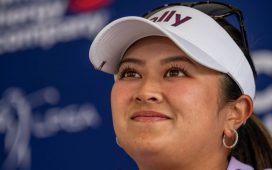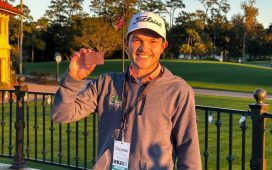The last two great rivalries in men’s professional golf — Greg Norman and Nick Faldo in the ‘90s, Tom Watson and Jack Nicklaus 15 years before that — shared two things in common: a handful of thrilling head-to-head showdowns in major championships, and an absence of sophomoric salvos on social media. Theirs were rivalries forged not by fingers on a keyboard but in final rounds that mattered. Brooks Koepka and Bryson DeChambeau, on the other hand, don’t have a rivalry. They have a pissing match, in which one is producing a more robust stream than the other can hope to muster.
The relationship between Koepka and DeChambeau was always destined to be a storyline at this U.S. Open. It’s the first event both men have played since DeChambeau had pro-Brooks hecklers booted from the Memorial Tournament and Koepka responded by having his sponsor, Michelob Ultra, reward the loudmouths with free beer.
If you’re keeping count, that’s two lousy precedents being set: that fans can be ejected because overly sensitive players don’t like their benign badgering and that a player incentivized meatheads to taunt that overly sensitive peer during competition. Those are problems for the PGA Tour rather than the USGA. Or at least they were until Tuesday.

Eamon Lynch
Brad Faxon, a well-connected former player and broadcaster, told SiriusXM radio that the USGA had considered pairing Koepka and DeChambeau for the first two rounds of the U.S. Open but that Bryson had “declined.” There is ample informed gossip at Torrey Pines to suggest Faxon’s claim is not baseless, but the wet blankets were quickly deployed.
The USGA denied entertaining the idea of putting them together.
DeChambeau’s agent, Brett Falkoff, released an artfully worded statement: “The USGA did not reach out to Bryson regarding a potential pairing the first two rounds with Brooks Koepka. Bryson is fully focused on defending the U.S. Open at Torrey Pines this week.”
Alert readers will note that Falkoff did not explicitly address whether anyone had reached out to DeChambeau’s management team.
When asked, DeChambeau said, “there was never really anything that went through me.”
[Parse; verb; analyze a sentence into its parts and describe their syntactic roles.]
Koepka said he personally wasn’t asked and that he wouldn’t care anyway. “I don’t care who I’m paired with. It doesn’t matter to me what goes on. It makes no difference to me,” he said. “I’m out there trying to play my own game. What happens inside the ropes, it won’t bother me.”
Plenty of golf fans did want this showdown at Torrey Pines, but the USGA did not take the bait. When the tee times were announced Tuesday, Koepka drew Justin Thomas and Collin Morikawa. His nemesis, the defending champion, goes with Hideki Matsuyama and Tyler Strafaci, current holders of the Masters and U.S. Amateur titles.
Some golf fans will bemoan that as a missed opportunity. In reality, for the USGA, it’s a dodged bullet.
For its 127-year history, the USGA has been a deliberate and ponderous body, disinclined to be bent to the popular passions of the moment. That’s obviously not always an asset, but in this instance, the decision not to pair Koepka and DeChambeau was the correct one. If the organization even entertained the notion — if — it would represent a wretched lapse in judgment, an incomprehensible willingness to allow its premier championship to become an accessory to a social media stunt.
A Koepka-DeChambeau pairing at Torrey Pines would be awesome for this tournament and for the entire sport, but let it be earned with their play rather than engineered by marketeers. And let it be on the weekend.
The thirst among golf lovers for a meaningful rivalry — preferably one with an edge — is palpable and understandable. Rivalries distinguish eras and give context to just how good the greats are. Tiger Woods was defined by having no rivals. Jack Nicklaus had several, and despite his unequaled record, he came off worse against his two most frequent challengers. Lee Trevino and Tom Watson beat Nicklaus into second place in major championships four times each. They never finished second to Jack.
Men’s golf is now a couple of generations removed from the last rivalry of substance. The game is ill-suited to producing regular head-to-heads. In tennis, Roger Federer has faced Rafa Nadal 40 times and Nadal has played Novak Djokovic 58 times. Yet this generation of golf stars has given us nothing by comparison. But golf fans are not fools: they know rivalries need a true competitive foundation. That’s why the seemingly endless roster of made-for-TV golf matches have been damp squibs. Everyone knows what’s at stake: nada.
Perhaps some folks think a Brooks-Bryson pairing would deliver a spectacle, say a little shoulder nudge on the tee, some coin jingling at an opportune moment. The reality is that it would only reinforce that professional tournament golf — particularly on Thursdays and Fridays — is a solo endeavor in which not much happens for five hours, where contestants need not even acknowledge each other’s existence. Which is why the organization most eager to see this soap opera canceled — the PGA Tour – ought to make it happen. There are surely plenty of tournament directors who would welcome the attention on slow days.
Manufacturing the pairing at Torrey Pines would have cheapened a major championship. Having it happen organically this weekend, would undoubtedly elevate it. DeChambeau said as much: “I think that, as time goes on, I hope on the weekend we can play against each other and compete. I think it would be fun and would be great for the game.”
Golf needs more of an edge, more personality and more personality conflict. Both Koepka and DeChambeau are enormous positives for the sport. But there also needs to be an adult in the room, and this week that means the USGA. Acceding to calls for the pairing would have been a lousy reflection on the organization.
Last year, the USGA unveiled a branding campaign to highlight the democratic nature of the U.S. Open and its famous qualifying process. The tagline was e pluribus unum. From many, one. There’s another Latin motto the organization should endeavor to live by when faced with calls to engage with stunts.
Non ducor duco.
“I am not led, I lead.”

